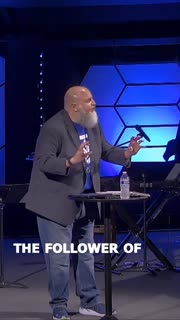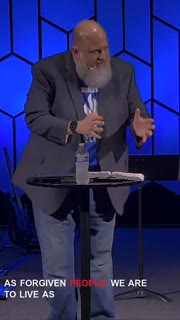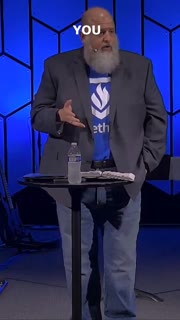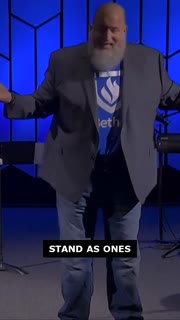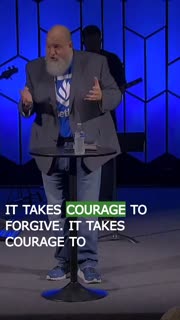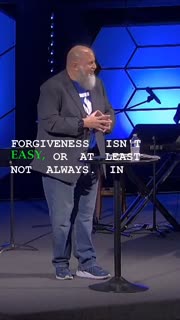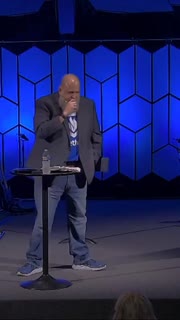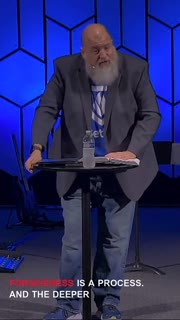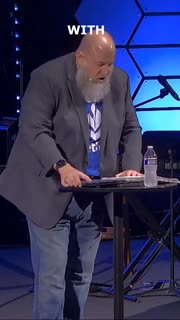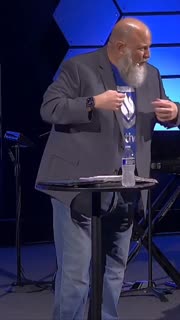Embracing Forgiveness: A Journey of Healing
Devotional
Sermon Summary
Bible Study Guide
Sermon Clips
### Quotes for Outreach
1. "Forgiveness for the follower of Jesus Christ is not just a suggestion. It's not just a good idea. It's the only way to live a life of peace in a world that is upside down. Even in this verse, we get the sense that there's no limits on forgiveness, right? If any of you has, a grievance. It could also be translated, any grievance. Big or small, you're to forgive as you have been forgiven." [44:37] (38 seconds)
2. "As forgiven people, we are to live as forgiving people. It's not easy, but it's possible. So today, what we're going to do is look at Psalm 7, and we're going to see what we can learn about forgiveness in the life and the heart of the child of God." [46:32] (17 seconds)
3. "You will not walk through life without experiencing hurt in your closest relationships. Not to mention the relationships that are, you know, kind of out on the fringes. Out on the fringes of your life. You will experience hurt. Now, we all know that all hurt is not the same. An affair hurts more than coming home from work two hours late consistently. They both hurt, but one hurts deeper and in a different way, right?" [50:53] (31 seconds)
4. "When we choose to say, you know what, I'm going to get even with that person. I'm going to make them feel a little bit of the pain that I felt. What we do is we pour our wrath on that person, and we take up the space that only God's wrath should have in their life. Venting my wrath can cancel or drown out in that person the effect of God's wrath poured out on Jesus Christ." [01:06:58] (60 seconds)
5. "It takes courage to forgive. It takes courage to stand up at your wife's funeral and say to everyone, we're going to forgive. It takes courage when you're being nailed to the cross to say, Father, forgive them. They don't know what they're doing. And it takes courage to forgive even the little relational slights that cause us pain." [01:10:08] (19 seconds)
### Quotes for Members
1. "Forgiveness isn't easy, or at least not always. In my life, most of the time, forgiveness isn't easy. Whether you're forgiving the family of the person who took your wife's life, whether you're forgiving the imbeciles who mocked you, whether you're forgiving the people who mocked your face, or the useful idiots who put it on TV, or whether you're forgiving somebody for perceived relational wrongs. It's not easy, but it has always been the standard by which we as followers of Jesus Christ are called to live." [45:37] (41 seconds)
2. "David shows a great bit of maturity, of class, by saying, you know what, some of this, some of this deal with Cush may be on me. Maybe I've done something wrong. Maybe I've added to the relational friction between us. I mean, think about it. This is David. Not yet King David, but anointed King David. He's already been anointed. He will be the next king of Israel." [54:01] (31 seconds)
3. "Forgiveness is a process. And the deeper the hurt, the longer the process takes. don't know about you, but I've never found, pretty much never found, forgiveness to be a switch that you flip. And, you know, the switch is down, so I'm not forgiving. I haven't forgiven that person. One morning I wake up and, whoop, oh, great, they're forgiven. We're all good. I don't know about you, but that's not how it works for me." [01:00:34] (30 seconds)
4. "Unless you deal with the hurt, you're going to remain stuck. Changing a class or a small group, it's not going to make the hurt go away. Skipping church won't help you to deal with the hurt. Finding a new church is only going to suppress the hurt. You're going to carry that hurt with you to your new church. You won't notice it for a while because you'll be in a great new honeymoon period with your new church or your new class or your new small group or whatever it is." [01:03:29] (29 seconds)
5. "When we get even, nothing's even. When God gets even, it's even better than even. It's right. It's the way it's supposed to be. I want to remind you what Paul says in Romans 12, 19. Don't take revenge, my friends, but leave room for God's. For it is written, is mine to avenge. I will repay, says the Lord." [01:05:08] (25 seconds)
Ask a question about this sermon
1. "Forgiveness for the follower of Jesus Christ is not just a suggestion. It's not just a good idea. It's the only way to live a life of peace in a world that is upside down. Even in this verse, we get the sense that there's no limits on forgiveness, right? If any of you has, a grievance. It could also be translated, any grievance. Big or small, you're to forgive as you have been forgiven." [44:37] (38 seconds)
2. "As forgiven people, we are to live as forgiving people. It's not easy, but it's possible. So today, what we're going to do is look at Psalm 7, and we're going to see what we can learn about forgiveness in the life and the heart of the child of God." [46:32] (17 seconds)
3. "You will not walk through life without experiencing hurt in your closest relationships. Not to mention the relationships that are, you know, kind of out on the fringes. Out on the fringes of your life. You will experience hurt. Now, we all know that all hurt is not the same. An affair hurts more than coming home from work two hours late consistently. They both hurt, but one hurts deeper and in a different way, right?" [50:53] (31 seconds)
4. "When we choose to say, you know what, I'm going to get even with that person. I'm going to make them feel a little bit of the pain that I felt. What we do is we pour our wrath on that person, and we take up the space that only God's wrath should have in their life. Venting my wrath can cancel or drown out in that person the effect of God's wrath poured out on Jesus Christ." [01:06:58] (60 seconds)
5. "It takes courage to forgive. It takes courage to stand up at your wife's funeral and say to everyone, we're going to forgive. It takes courage when you're being nailed to the cross to say, Father, forgive them. They don't know what they're doing. And it takes courage to forgive even the little relational slights that cause us pain." [01:10:08] (19 seconds)
### Quotes for Members
1. "Forgiveness isn't easy, or at least not always. In my life, most of the time, forgiveness isn't easy. Whether you're forgiving the family of the person who took your wife's life, whether you're forgiving the imbeciles who mocked you, whether you're forgiving the people who mocked your face, or the useful idiots who put it on TV, or whether you're forgiving somebody for perceived relational wrongs. It's not easy, but it has always been the standard by which we as followers of Jesus Christ are called to live." [45:37] (41 seconds)
2. "David shows a great bit of maturity, of class, by saying, you know what, some of this, some of this deal with Cush may be on me. Maybe I've done something wrong. Maybe I've added to the relational friction between us. I mean, think about it. This is David. Not yet King David, but anointed King David. He's already been anointed. He will be the next king of Israel." [54:01] (31 seconds)
3. "Forgiveness is a process. And the deeper the hurt, the longer the process takes. don't know about you, but I've never found, pretty much never found, forgiveness to be a switch that you flip. And, you know, the switch is down, so I'm not forgiving. I haven't forgiven that person. One morning I wake up and, whoop, oh, great, they're forgiven. We're all good. I don't know about you, but that's not how it works for me." [01:00:34] (30 seconds)
4. "Unless you deal with the hurt, you're going to remain stuck. Changing a class or a small group, it's not going to make the hurt go away. Skipping church won't help you to deal with the hurt. Finding a new church is only going to suppress the hurt. You're going to carry that hurt with you to your new church. You won't notice it for a while because you'll be in a great new honeymoon period with your new church or your new class or your new small group or whatever it is." [01:03:29] (29 seconds)
5. "When we get even, nothing's even. When God gets even, it's even better than even. It's right. It's the way it's supposed to be. I want to remind you what Paul says in Romans 12, 19. Don't take revenge, my friends, but leave room for God's. For it is written, is mine to avenge. I will repay, says the Lord." [01:05:08] (25 seconds)
